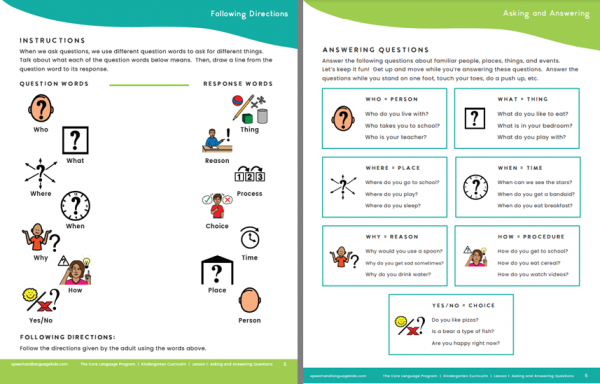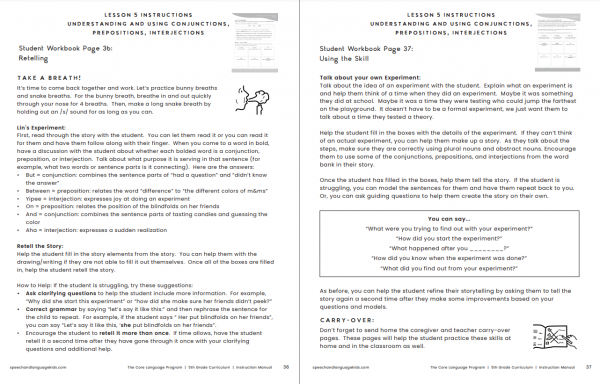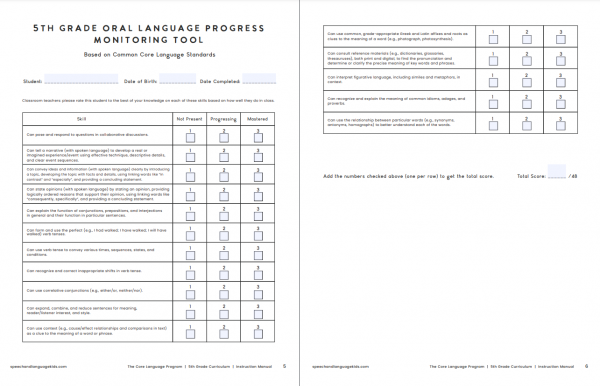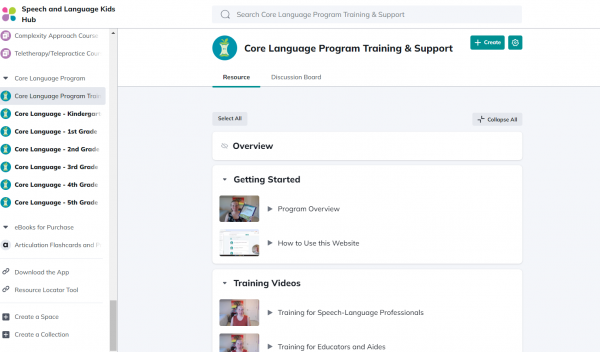Pre-Made LessonsDirect InstructionSupportAHA! Moments for Children with Language Delays
A Curriculum-Aligned Oral Language Program that Works!
Our 16-week program will explicitly teach each oral language skill in the Common Core Curriculum for one grade level. Can be administered by classroom teachers/staff as a Tier 2 intervention or in speech/language therapy as a Tier 3 intervention.
No Prep! No cutting, no laminating, and no bulky manipulatives to keep track of. Just print the student workbook and put it in a binder. That’s all you need to do!

Confidently Teach Language Skills to Struggling Learners
Who is this Program for?
Speech-Language Pathologists and Professionals
No-Prep Language Therapy
Use this program as a foundation for your language therapy sessions. Our pre-made, no-prep lessons will make your therapy sessions simple and effective. Plus, we’ll include training on how to modify these lessons to meet the needs of every student during your therapy sessions.
Educators
Tier 2 Intervention for Struggling Readers
Use this program to help boost language skills for your struggling learners. This program will allow you to document Tier 2 supports being administered to those students who are behind. Aligned with the Common Core Curriculum for evidence-based support.
Parents and Caregivers
Help Your Child Catch Up
Simple lessons you can do at home with your child to boost their language skills and help them catch up to their peers. This program includes the student workbook along with an instruction manual to show you exactly how to teach each skill. No cutting or laminating, simply print and go!
Catch Up in Speaking, Reading, and Writing
Pre-Made Lessons for Improving Underlying Language Skills:
During the pandemic, children fell behind in their learning and many have not yet recovered from that learning deficit (source). However, schools and educators are struggling with staffing shortages and budget cuts that make it hard to help these students catch back up.
Language delays can impact a child’s speaking, reading, and writing. When a child with a language delay is struggling in the classroom, it falls on the teachers and speech-language pathologists to help them catch up on those skills. But our educators and specialists are overworked as well and it’s not always clear how to help these children.
Fortunately, there is now a program that will get these children back on track! Our language curriculum contains pre-made lessons and activities to explicitly teach all of the language skills for an entire grade level in just 16 weeks. That means that in one school year, a child can catch up on two grade levels worth of language skills.
Each Grade Level Comes With…
Purchase Options:
Already a member of The Hub? Click Here to Add the Core Language Program to your Plan
Individual Grade Levels(Kindergarten-5th)
Full Program(Kindergarten-5th)
Core Language Program +Lifetime Membership to The Hub
Individual Grade Levels:
Kindergarten Only
3rd Grade Only
1st Grade Only
4th Grade Only
2nd Grade Only
5th Grade Only
We Accept Purchase Orders!
Skills Covered:
Each lesson targets…
Foundational Language Skills:
1. Ask and Answer Questions (Download the Free Sample!)
2. Understanding and Telling Narratives
3. Understanding and Providing Information
4. Understanding and Stating Opinions
Syntax Skills:
5. Using Frequently Occurring Nouns
6. Forming Regular Plural Nouns
7. Using Frequently Occurring Verbs
8. Understanding and Using Question Words (Interrogatives)
9. Using the Most Frequently Occurring Prepositions
10. Producing and Expanding Complete Sentences
Vocabulary Skills:
11. Identifying New Meanings for Familiar Multiple-Meaning Words
12. Using the Most Frequently Occurring Affixes (-s, -ed, re-, un-, etc.)
13. Relating Common Words to their Opposites (Antonyms)
14. Sorting Common Objects into Categories
15. Distinguishing Shades of Meaning Between 2 Similar Verbs
16. Identifying Real-World Connections Between Words and their Use
Foundational Language Skills:
1. Ask and Answer Questions
2. Understanding and Telling Narratives
3. Understanding and Providing Information
4. Understanding and Stating Opinions
Syntax Skills:
5. Using Common, Proper, and Possessive Nouns + Determiners (Articles, Demonstratives)
6. Using Singular and Plural Nouns with Matching Verbs
7. Using Personal Possessive and Indefinite Pronouns
8. Using Past, Present, and Future Verbs
9. Using Adjectives
10. Using Conjunctions and Prepositions
Vocabulary Skills:
11. Using Context to Understand Unknown Words (Including Multiple Meaning Words and Feeling/Senses Words)
12. Understanding and Using Affixes
13. Understanding and Using Root Words and Inflectional Forms
14. Sorting Words into Categories and Defining Words with Key Attributes
15. Identifying Real-World Connections Between Words and their Use
16. Distinguishing Shades of Meaning Between Similar Words
Foundational Language Skills:
1. Ask and Answer Questions
2. Understanding and Telling Narratives
3. Understanding and Providing Information
4. Understanding and Stating Opinions
Syntax Skills:
5. Using Collective Nouns and Irregular Plural Nouns
6. Using Reflexive Pronouns
7. Using Past Tense Verbs
8. Using Adjectives and Adverbs
9. Using Compound Sentences
10. Understanding and Using Formal vs. Informal English
Vocabulary Skills:
11. Using Context to Guess at Unknown Words
12. Understanding and Using Prefixes and Root Words
13. Defining Words Using Glossaries and Dictionaries (Including Multiple Meaning Words)
14. Using Compound Words
15. Identifying Real-World Connections Between Words and their Use
16. Distinguishing Shades of Meaning Between Closely Related Verbs and Adjectives
Foundational Language Skills:
1. Ask and Answer Questions
2. Understanding and Telling Narratives
3. Understanding and Providing Information
4. Understanding and Stating Opinions
Syntax Skills:
5. Using Regular and Irregular Nouns and Abstract Nouns
6. Using Regular and Irregular Verbs + Simple Verb Tenses
7. Using Proper Subject/Verb and Pronoun/Antecedent Agreement
8. Understanding and Using Possessives
9. Using Comparative and Superlative Adjectives and Adverbs
10. Using Coordinating and Subordinating Conjunctions + Simple, Compound, and Complex Sentences
Vocabulary Skills:
11. Using Sentence Level Context as a Clue to the Meaning of an Unknown Word or Phrase
12. Using Affixes and Root Words
13. Using Glossaries and Dictionaries to Define Words
14. Understanding Literal vs. Non-literal Meanings
15. Identifying Real-World Connections Between Words and their Use
16. Distinguishing Shades of Meaning Between Similar Words
Foundational Language Skills:
1. Ask and Answer Questions
2. Understanding and Telling Narratives
3. Understanding and Providing Information
4. Understanding and Stating Opinions
Syntax Skills:
5. Using Relative Pronouns and Adverbs
6. Using Progressive Verb Tenses
7. Using Modal Auxiliaries
8. Using Proper Order for Adjectives in a Sentence
9. Using Prepositional Phrases
10. Producing Complete Sentences and Recognizing Fragments/Run Ons
Vocabulary Skills:
11. Using Context to Figure out Unknown Words
12. Understanding and Using Greek and Latin Affixes
13. Using Reference Materials to Define Unknown Words
14. Understanding and Using Similes and Metaphors
15. Understanding and Using Idioms and Proverbs
16. Understanding and Using Antonyms and Synonyms
Foundational Language Skills:
1. Ask and Answer Questions
2. Understanding and Telling Narratives
3. Understanding and Providing Information
4. Understanding and Stating Opinions
Syntax Skills:
5. Explaining the Function Conjunctions, Prepositions, Interjections
6. Using Perfect Verb Tenses
7. Using Verb Tense to Convey Times, Sequences, States, and Conditions
8. Recognizing and Correcting Inappropriate Shifts in Verb Tense
9. Using Correlative Conjunctions
10. Expanding, Combining, and Reducing Sentences
Vocabulary Skills:
11. Using Context to Identify Word Meanings
12. Understanding and Using Greek and Latin Affixes and Root Words
13. Using Reference Materials to Identify Unknown Words
14. Understanding and Using Similes and Metaphors
15. Understanding and Using Idioms
16. Understanding and Using Synonyms, Antonyms, and Homographs









